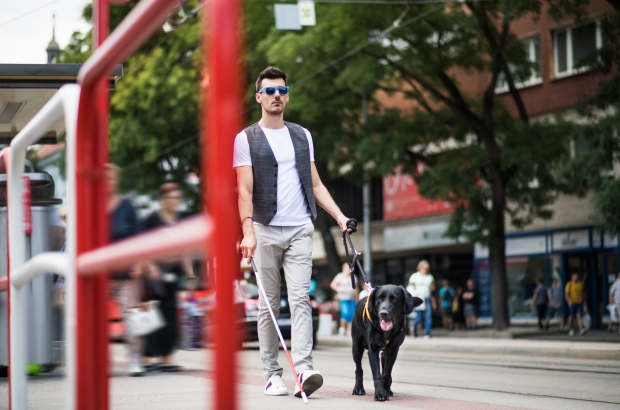- Daily & Weekly newsletters
- Buy & download The Bulletin
- Comment on our articles
More than half of visually impaired people do not feel safe on the street
More than half of people with visual impairments do not feel safe in public in Belgium, a new survey released by the Braille League has found.
The survey reported that more than nine out of 10 respondents frequently encountered obstacles in the street, including electric scooters, private rubbish bins and piles of cardboard boxes, to name just a few.
Some 55% of respondents said that they did not feel safe in the street as a result.
Braille League communications officer Sylvie Degrelle said that Belgium’s urban environments had changed drastically over the past decade – in particular with the proliferation of electric scooters.
“The problem is not the scooter, it's the people who ride the scooters, who often go too fast and don't realise that there are visually impaired or blind people on the pavements waiting and who are brushed against, even unfortunately hit,” she said.
Nevertheless, she said, more people with visual impairments were walking the streets than in previous years.
“A decade ago, seven out of ten blind and partially sighted people went out every day, or almost,” she said. “We are at almost nine out of 10 today, so that means that there are more people going out, and that obviously makes us very happy.”
Vanessa Vermeiren, who has been visually impaired since the age of 28, told RTBF that it had taken her time to learn to live with her condition.
“My sight has diminished over time, until the day I left my house to go do some shopping in a neighbourhood store, so really not far, and I had barely taken 50 steps - it was grey and I went back home in tears, I turned around and that's when I said to myself: 'I have to learn how to use this white cane'.”
Vanessa said that she believed the situation was slowly improving for people with visual impairments.
“We are already weak people,” she said. “Just seeing the white cane, people think we are blind. It’s not the case, lots of people are visually impaired.
"Now, there is progress with the tactile tiles and people who come to us and ask 'do you want help, madam?'. Fortunately, I remain positive.”

















